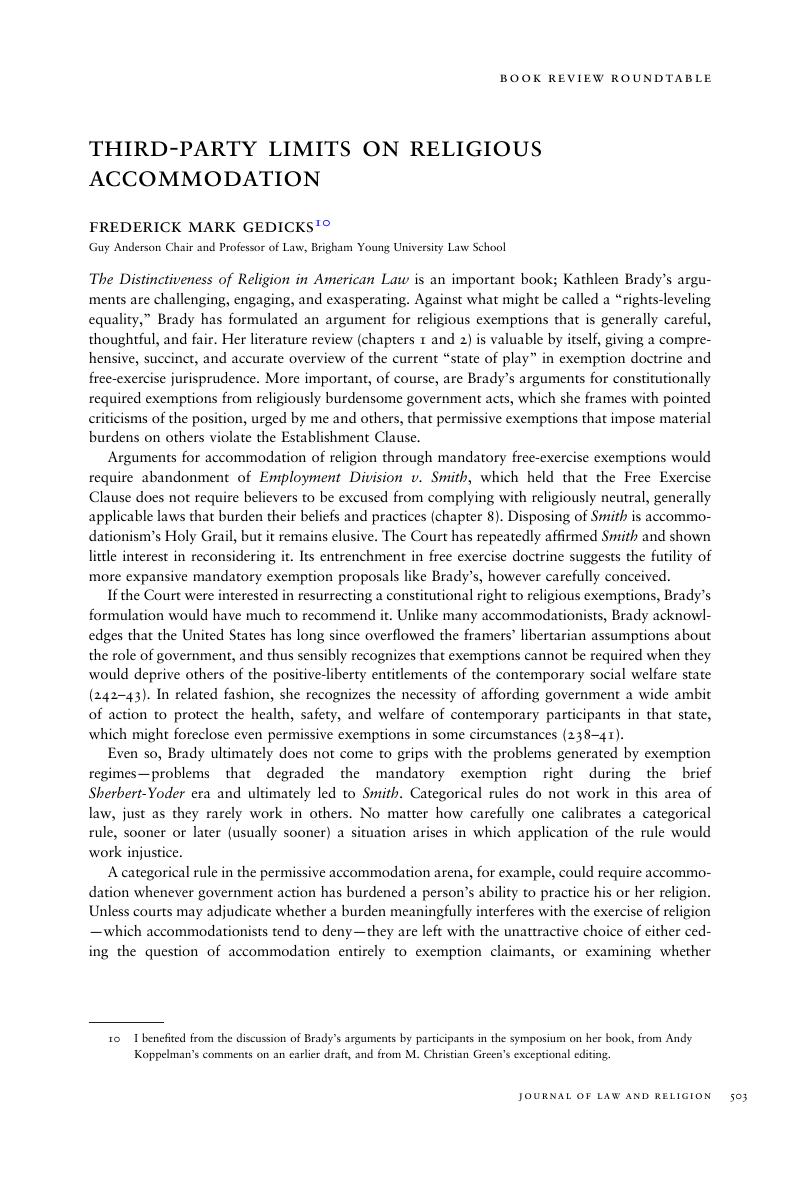No CrossRef data available.
Published online by Cambridge University Press: 12 April 2018

10 I benefited from the discussion of Brady's arguments by participants in the symposium on her book, from Andy Koppelman's comments on an earlier draft, and from M. Christian Green's exceptional editing.
11 Gedicks, Frederick Mark, “‘Substantial’ Burdens: How Courts May (and Why They Must) Judge Religious Burdens under RFRA,” George Washington Law Review 85, no. 1 (2017): 94–151Google Scholar, at 104–15; cf. n. 17.
12 Criticizing Gedicks, Frederick Mark and Koppelman, Andrew, “Invisible Women: Why an Exemption for Hobby Lobby Would Violate the Establishment Clause,” Vanderbilt Law Review En Banc, no. 67 (2014): 51–66Google Scholar; Gedicks, Frederick Mark and Van Tassell, Rebecca G., “RFRA Exemptions from the Contraception Mandate: An Unconstitutional Accommodation of Religion,” Harvard Civil Rights-Civil Liberties Law Review 49, no. 1 (2014): 343–84Google Scholar.
Brady also notes but does not engage Micah Schwartzman, Richard Schragger, and Nelson Tebbe, “Hobby Lobby and the Establishment Clause, Part III: Reconciling Amos and Cutter,” Balkinization (blog), December 9, 2013, http://balkin.blogspot.com/2013/12/hobby-lobby-and-establishment-clause_9.html; Nelson Tebbe, Richard Schragger, and Micah Schwartzman, “Hobby Lobby and the Establishment Clause, Part II: What Counts as a Burden on Employees?,” Balkinization (blog), December 4, 2013, http://balkin.blogspot.com/2013/12/hobby-lobby-and-establishment-clause.html.
13 Estate of Thornton v. Caldor, 472 U.S. 703, 708 (1985).
14 Gedicks and Van Tassell, “RFRA Exemptions from the Contraception Mandate,” 384.
15 This is a particular danger when one is engaged as an advocate in issues of the day, as I learned from my involvement in the contraception mandate cases. The urge to win leads to the framing of opposing arguments in the worst, uncharitable light, and the temptation to rhetorical overstatement can be overwhelming.
16 S.B. 296, 2015 General Session (Utah, 2015) (amending state antidiscrimination and fair housing laws to prohibit sexual-orientation discrimination subject to exemptions for certain religious actors), http://le.utah.gov/~2015/bills/static/sb0296.html. This so-called Utah Compromise has been criticized by both LGBT and conservative Christian activists, but may represent the only realistic template for statutory antidiscrimination protection of LGBT persons in politically conservative states.
17 See NeJaime, Douglas and Siegel, Reva B., “Conscience Wars: Complicity-Based Conscience Claims in Religion and Politics,” Yale Law Journal 124, no. 7 (2015): 2574–77Google Scholar (arguing that government exemptions for religious claimants who wish to avoid “complicity with evil” stigmatize third parties as sinners).
18 See Koppelman, Andrew, “A Free Speech Response to the Gay Rights/Religious Liberty Conflict,” Northwestern University Law Review 110, no. 5 (2016): 1125–67Google Scholar; Koppelman, Andrew, “Gay Rights, Religious Accommodations, and the Purposes of Antidiscrimination Law,” Southern California Law Review 88, no. 3 (2015): 619–59Google Scholar.
19 Gedicks, Frederick Mark and Van Tassell, Rebecca G., “Of Burdens and Baselines: Hobby Lobby’s Puzzling Footnote 37,” in The Rise of Corporate Religious Liberty, ed. Schwartzman, Micah, Flanders, Chad, and Robinson, Zoë (New York: Oxford University Press, 2016), 323–41CrossRefGoogle Scholar.
20 See, for example, Gedicks, Frederick Mark, “One Cheer for Hobby Lobby: Improbable Alternatives, Truly Strict Scrutiny, and Third-Party Employee Burdens,” Harvard Journal of Law and Gender 38, no. 1 (2015): 153–76Google Scholar, at 172.
The classic eighteenth-century establishment of religion imposed tax burdens and legal disabilities on nonmembers that it did not impose on members; among other things, the Establishment Clause was meant to eliminate the practice of making some pay for the religious obligations and observances of others. An important dimension of the Founders' understanding of religious liberty, therefore, was the freedom to make one's own choices about religion and religious belief, with whatever costs those entail, without also bearing the costs of religious choices made by others.
Ibid.; see also Gedicks, Frederick Mark and Koppelman, Andrew, “The Costs of the Public Good of Religion Should Be Borne by the Public,” Vanderbilt Law Review En Banc, no. 67 (2014): 185–87Google Scholar, at 187.